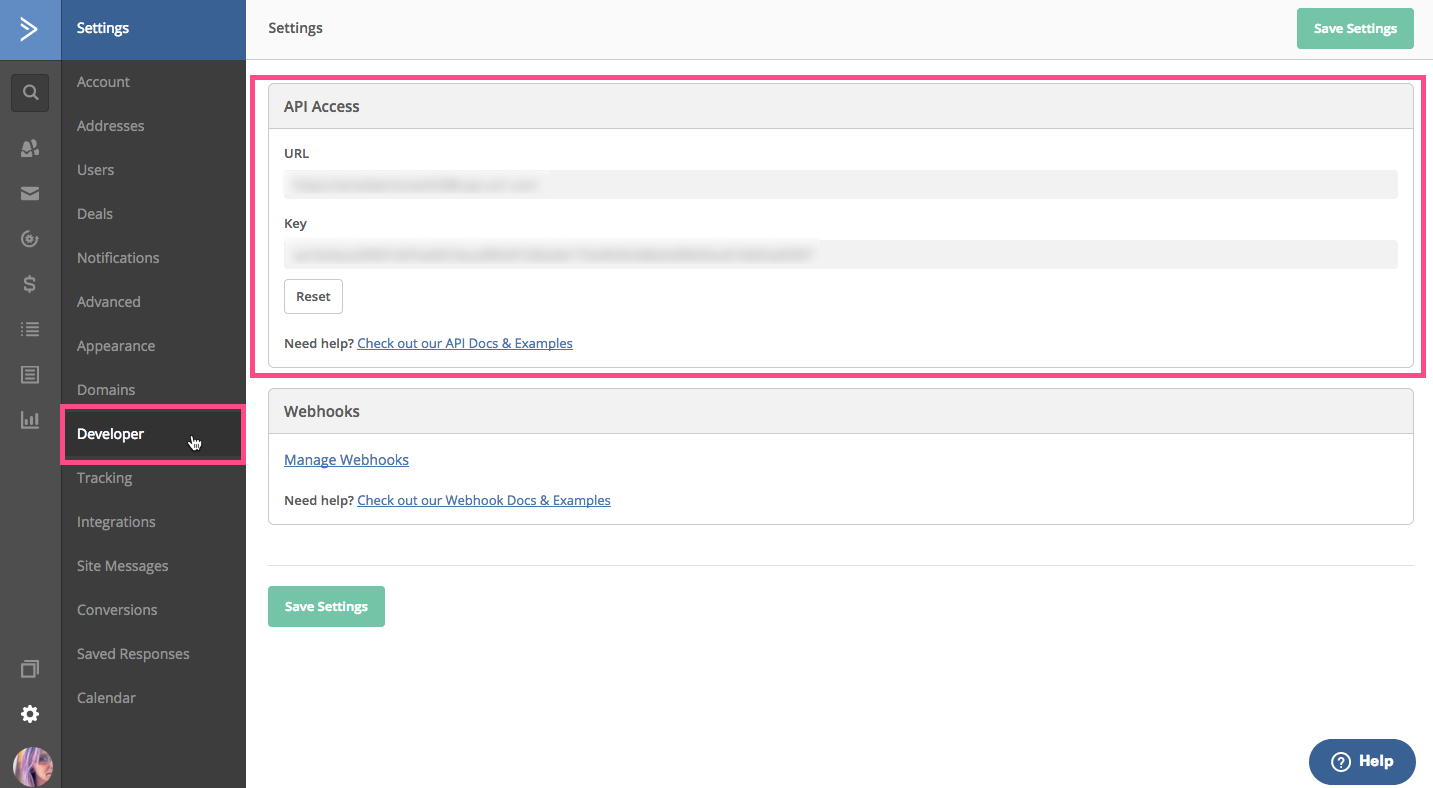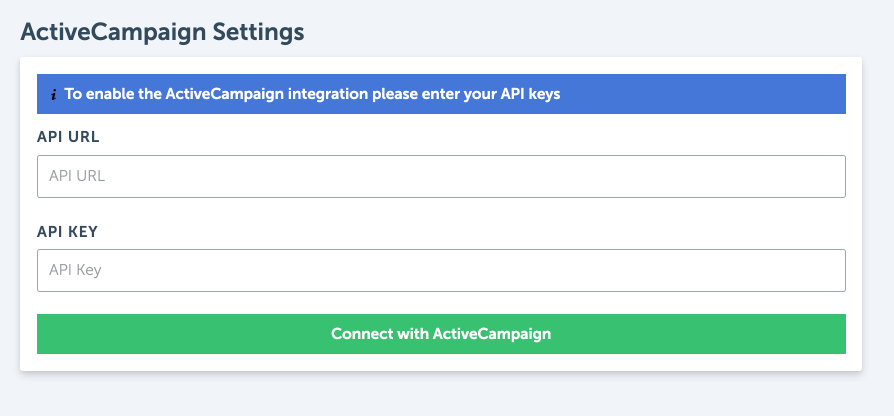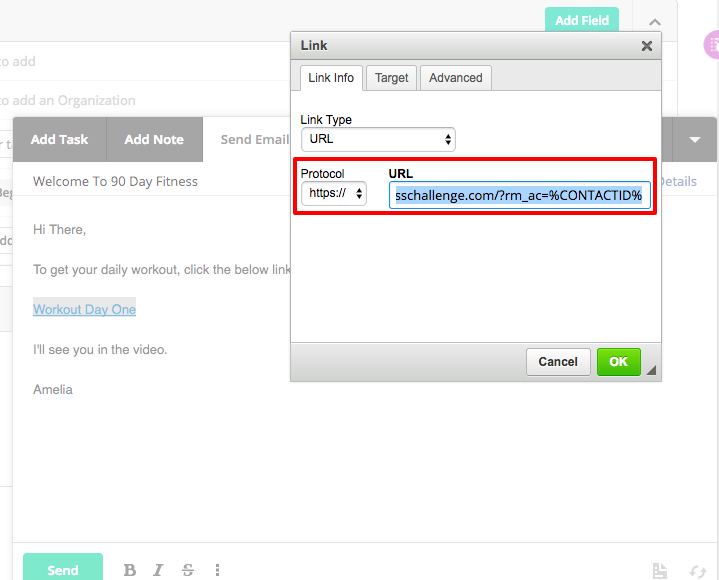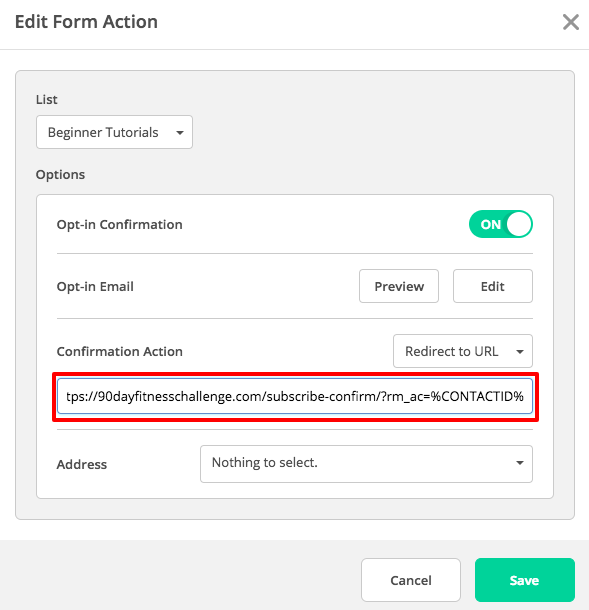Integrating RightMessage with ActiveCampaign
Once you’ve integrated your RightMessage account with ActiveCampaign, you’ll be able to use us to capture new subscribers, segment your ActiveCampaign lists, and personalize your website with ActiveCampaign tags and custom fields.
In this guide, we cover everything you need to know about segmenting and personalizing with ActiveCampaign + RightMessage.
Linking RightMessage with ActiveCampaign
To create a link between RightMessage and ActiveCampaign, all you need to do is add your ActiveCampaign API URL and API Key to your RightMessage account.
Here’s how:
Step 1: Find your API URL and API Key
First, log in to your ActiveCampaign account and select Settings at the bottom left of your dashboard.
Then select Developer.
The URL and Key data is listed within the API Access area.

Step 2: Paste your Key and Secret into the RightMessage integration area
In RightMessage, click on the ‘gear’ icon and select Integrations
On the left, choose ActiveCampaign
Paste in your API URL and API Key into the respective fields and click Connect with ActiveCampaign.

That’s it!
Identifying ActiveCampaign subscribers on your website
There are a handful of ways that RightMessage “knows” when someone on your website is also in your ActiveCampaign account.
For information on how we identify visitors, you’re going to want to read this crash course guide first. Once you’ve read that, here are the nuances specific to ActiveCampaign…
ID’ing whenever you send an email
Links that point to your website in ActiveCampaign-sent emails will need to be slightly modified in order to pass along the contact’s ID to your website and, thus, to RightMessage.
Doing this is straightforward:
When adding a link in ActiveCampaign, modify the URL to include ?rm_ac=%CONTACTID% to the end of it.

ActiveCampaign’s templating engine will replace %CONTACTID% with the actual Contact ID of the recipient, so that someone (say, Contact #12345) will get an email that links to something like https://yoursite.com/new-blog-post?rm_ac=12345
RightMessage will strip out the rm_ac=... bit so that should they share your latest blog post on social media, their unique ID won’t be included.
ID’ing when an ActiveCampaign form is submitted
Forms in ActiveCampaign can be configured to send new contacts to a custom confirmation page, and the same rm_ac query parameter that you’re appending to links can also be added to the URL the form is redirecting people to.
(If you’re using RightMessage to opt people in via our CTA Funnels, there’s no need to do this – it’s automatic.)
Here’s a help doc from ActiveCampaign’s website on how to configure your forms to do this.
Simply modify the Confirmation Action URL to include ?rm_ac=%CONTACTID%

ActiveCampaign forms and RightMessage’s forms?
Even if you switch entirely to using RightMessage’s forms rather than ActiveCampaign’s, we recommend that you continue to create ActiveCampaign forms.
Every unique offer in a CTA Funnel, like your newsletter opt-in form, should map to a complimentary newsletter opt-in form you’ve created in ActiveCampaign.
You’re going to want to do this both for attribution and automation reasons. By creating this link, you’ll be able to go into any subscriber in ActiveCampaign and see that they’ve submitted so-and-so forms.
You’re not going to need to worry about what you name these forms, or how they’re styled in ActiveCampaign, their redirect confirmation URL, etc. We’re just going to be using these forms as references.
The ActiveCampaign data we can use to segment website visitors
When a visitor is back on your website, RightMessage has immediate access to:
- Their list of tags
- Their custom fields
Check out our sections on segmentation, website personalization, and CTA Funnels for guidance on how to use this data.
Outputting custom fields (like someone’s first name) on your website
With RightMessage, you can output known data (like custom fields) directly to your website. In our guide to adding contextual data and merge tags, we cover how to do this. But below is a bit of ActiveCampaign-specific context.
To include an ActiveCampaign custom field value within a text personalization, add: {{ activecampaign.customFields.favorite_color }}, replacing favorite_color with your custom field of choice. (This field should not have any spaces. Either include underscores, your_favorite_color, or leave it as a single word, industry.)
An exception should be made for outputting someone’s first name, last name, or phone, which are special custom fields in ActiveCampaign. To output the firstName custom field, use: {{ activecampaign.firstName }}
And to output someone’s email address: {{ activecampaign.email }}
ConvertKit
Once you've integrated your RightMessage account with ConvertKit, you'll be able to use us to capture new subscribers, segment your ConvertKit subscribers, and personalize your website with ConvertKit tags and custom fields.
- About Us
- Contact Sales
- Contact Customer Support
- © RightMessage Inc. 2024
- Privacy Policy
- Terms of Service
